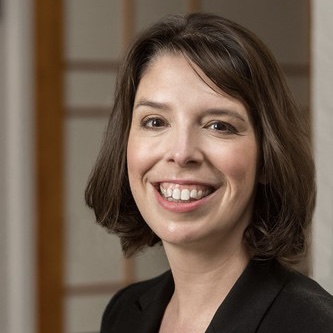Curriculum Vitae
Education
Websites
Professional Bio
Sarah Damaske is an award-winning author and scholar of gender, work-family, unemployment, and inequality. She is a professor of sociology and labor and employment relations at Pennsylvania State University, where she serves as the Associate Director of the Population Research Institute. Dr. Damaske is the author of three books, including The Tolls of Uncertainty: How Privilege and the Guilt Gap Shape Unemployment in America published by Princeton University Press in May 2021. Winner of the 2023 American Sociological Association’s William J. Goode Book Award, The Tolls of Uncertainty “offers unparalleled insight into the trajectories of the unemployed and makes poignant contributions to our understanding of economic inequality and gender,” according to a review in Social Forces.
Dr. Damaske’s books also include The Science and Art of Interviewing (Oxford, 2020, co-authored with Kathleen Gerson) and For the Family: How Class and Gender Shape Women’s Work (Oxford 2011), which was named one of the “most influential books published on the family since 2000” by Contemporary Sociology, and awarded the National Women’s Studies Association Sara Whaley Prize and the North Central Sociological Association Scholarly Achievement Award.
Dr. Damaske’s research is regularly cited in the media, including numerous pieces in the New York Times, the Washington Post, and NPR, as well as featured stories in the Wall Street Journal, ABC Nightly News, and the BBC. She also writes for mainstream audiences with Op-Eds in Time, CNN, Harvard Business Review, The Conversation, Psychology Today, and the Gender & Society blog. She is a frequently invited speaker at international conferences, universities, and events, including at the National Academies of Sciences, Harvard University, the University of Pennsylvania, EMBO/EMBL (Germany), and the University of Wisconsin at Madison.
Her research is regularly published in top academic journals. Recently, she has published papers on the intersection of education and race in women’s work and family trajectories, the relationship between men’s earnings over their lives and their health at middle-age, the life course of unemployment, the relationship between women’s work and family patterns and their experiences of stress, and on how class and gender shape job searches during unemployment in Demography, The American Journal of Sociology, Work and Occupations, Social Forces, and Gender & Society.
Support for her research is provided by organizations including the National Science Foundation, the Eunice Kennedy Shriver National Institute of Child Health and Human Development at the National Institutes of Health, the Woodrow Wilson Foundation, the American Sociological Association, and the Work-Family Research Network.
A graduate of Hamilton College (BA) and New York University (MA and PhD), Dr. Damaske spent two years in Houston as a postdoctoral fellow at Rice University.
Current Research
Dr. Damaske’s current projects center around three primary avenues of inquiry:
Gendered work-family constraints
With Dr. Adrianne Frech, Dr. Damaske is developing a book proposal that dispels common myths about men’s and women’s labor force participation. Drawing on research using the National Longitudinal Survey of Youth 1979 and 1997, Drs. Damaske and Frech make the case that there is significantly more heterogeneity among women and among men than across gender groups. Moreover, they argue that growing economic insecurity plays a previously underexamined role in how gender continues to matter in the labor force.
In a study supported by the CISCO foundation, Dr. Damaske works with a team of graduate students, notably Jisu (Jason) Park and Jiwon Choi, analyzing novel survey data that includes open-ended qualitative responses designed to make sense of how men and women in the Computer Science, Engineering, and Mathematics (CSEM) fields made decisions about entering and remaining in these fields. The study goal is to identify potentially malleable factors that may be targets for intervention. There are a number of working papers from this project, including one that examines the relationship between job tenure, work challenges, and gender in CSEM organizations.
Employment precarity
Dr. Damaske has collected pilot study data for a new qualitative interviewing project investigating worker responses to growing labor market precarity in the 21st century. This project is particularly focused on the relationship between workers’ perceptions of labor market precarity and their work commitments and strategies for navigate working uncertainty at. One of the project’s goals is to better understand the paradox of the long-term trends of declining worker engagement (e.g., quiet quitting) and declining labor force attachment amidst strong evidence that most U.S. workers still adhere to norms that require high work devotion.
Along with Dr. Frech, Dr. Damaske is working on a number of papers investigating longitudinal trends in labor market precarity. A working paper (co-authored with Jason Park) uses the National Longitudinal Surveys of Youth, 1979 and 1997 cohorts, to estimate group-based multi-trajectories of longitudinal work experiences for two cohorts and predict membership in these multi-trajectories. A second working paper (co-authored with Hilary Wething) uses the National Longitudinal Study of Youth – 1979 cohort to identify group-based trajectories of unemployment across ages 27-49, and estimate associations between unemployment trajectories and midlife wages and income.
Longitudinal employment patterns and midlife health disparities
A critical puzzle in the study of gendered health disparities is the paradox between women’s rising human capital and the persistent gender gap in midlife health. At midlife, women report poorer mental health and physical functioning and higher levels of chronic disease, pain, multi-morbidity, and depression than do men. This gender gap in midlife morbidity persists, even though women have made enormous gains in human capital—as measured by education and labor force attachment—since the 1970s. Along with Dr. Frech, Dr. Damaske is leading a team (including Drs. Luo, Wething, and Ohler) to investigate this paradox.
